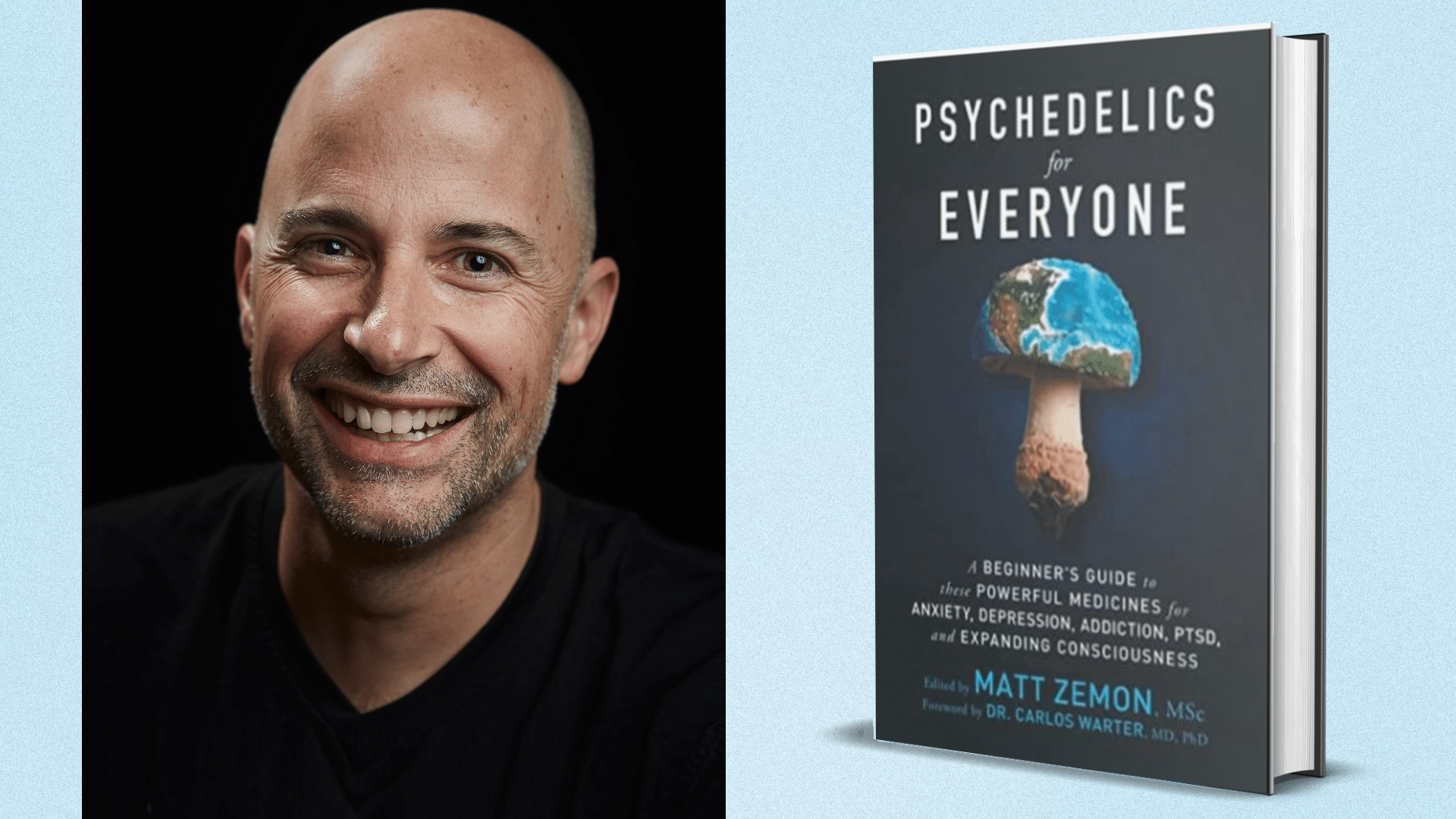Psychedelics Expert Matt Zemon MSc Talks About What Bill 58 in California Could Do & It’s Potential Impact on Psychiatric Therapies
With California on the verge of decriminalizing some psychedelics with the reintroduction of Bill 58, we thought it was important to discuss what legalization and decriminalization means for the general public.
Recent studies show that some psychedelics offer new hope in the treatment of depression and anxiety. Scientists are finding increasing evidence for the benefits of ketamine, psilocybin mushrooms, and MDMA. Major universities and pharmaceuticals are studying psychedelic drugs for mental health – with almost 100 clinical studies happening right now and more than 300 university psychedelic programs in place. What does this mean for the average Californian who is interested in psychedelic-assisted therapy?
Entrepreneur and researcher Matt Zemon, MSc is the author of a well-researched and enlightening tome, Psychedelics For Everyone: A Beginner’s Guide to These Powerful Medicines for Anxiety, Depression, Addiction, PTSD and Expanding Consciousness. Matt sat down with us today to discuss Bill 58, history and promise of psychedelic-assisted therapy for mental health, plus other science-backed resources to educate consumers on the myths, facts, real experiences, and legalities of psychedelic drugs.
California is on the verge of becoming the latest state to decriminalize psychedelics for personal and therapeutic use, building on a growing movement across the country to rethink the so-called war on drugs. Do you think this is a step in right direction & why?
There are multiple paths to the legalization and decriminalization of psychedelics that are worthy of exploration, and I am excited to see California on the verge of decriminalizing some psychedelics. Senator Scott Wiener is doing powerful and important work by reintroducing Bill 58, particularly after the bill was gutted last year to remove synthetic medicines.
In addition to the work being done at the state level, a number of cities in California have already decriminalized the possession of natural psychedelics, including San Francisco, Santa Cruz, and Oakland.
Decriminalization and legalization are complicated topics. Let me take a minute to try to cover the basics.
Many people believe that the government should not make plants or fungi illegal. The Decriminalize Nature movement has chapters across the country who are working with city and state governments to decriminalize entheogenic plants and fungi. These volunteers are doing great work to educate and inform the public about the power of entheogenic plants and fungi and to work towards a resolution. This is good and important work but just one leg of a three-legged stool of solutions.
The second leg of the stool is the medical leg. For this leg, people and organizations approach psychedelics from a medicinal perspective and are looking for FDA approvals and medical-based protocols for access and treatment. Organizations like the Multidisciplinary Association of Psychedelic Studies led by Dr. Rick Doblin are showing that this path is possible. The ballot initiatives in Colorado and Oregon both included the creation of a medical industry around psychedelic medicine. This includes natural psychedelics (i.e. psilocybin, iboga, Ayahuasca, etc…) as well as man-made medicines (MDMA, LSD, DMT, synthetic 5-MeO-DMT, etc….) and is also an important path.
The third leg of the stool is the religious leg. This final leg relates to the sincerity of belief that many people have that ingesting psychedelic sacraments enables them to connect more deeply with a higher power. As psychedelics have been used in religious ceremonies for thousands of years, this belief has a rich and deep lineage. Entheogenic churches have been created in many parts of the United States under the belief that they are protected through religious freedom principles.
All of these paths are steps in the right direction and happening right now.
Psilocybin, a hallucinogen found in certain types of mushrooms, and ketamine are already being used in psychedelic-assisted therapy by patients and doctors. Do you think this is the game changer that the mental health industry has been hoping for and if so why?
The game changer for mental health is the intersection of frustration with the existing solutions and access to real information as to the power of psychedelic medicine.
To answer this question I am going to start with a medicine most people are familiar with: Antidepressants. Antidepressants don’t work in roughly 40% of the people who are prescribed them and, even when they do work, they come with a high price tag of side effects. Antidepressant side effects include gastrointestinal issues, sexual dysfunction, emotional blunting, insomnia, weight gain, headaches, suicidal ideation, and more. People suffering with depression, anxiety, PTSD, and other mental health challenges are demanding an alternative.
Meanwhile, the research on ketamine continues to show its safety and efficacy for mental health without the side effects. Some medical professionals are questioning why this is not tried first as opposed to after treatment with antidepressants fail.
Running parallel to this, after an almost 50-year prohibition, hundreds of academic institutions across the world are researching the power of other psychedelic medicine for mental health. The FDA has already granted “Breakthrough Therapy” designation to both MDMA and Psilocybin. Based on the overwhelmingly positive and statistically significant results of phase 3 clinical trials of MDMA on treatment-resistant PTSD, MDMA is expected to be legalized within the next two years.
Are psychedelic medicines “cure-alls” that will work for everyone? Of course not. That being said, study after study is showing how powerful of a tool these can be for a wide variety of mental health challenges and a tremendous portion of the population.
In your book, Psychedelics for Everyone, you write about your own experiences with these drugs. Can you share some of the health and wellness benefits of psychedelics for treating mental health disorders?
I believe that psychedelics are a catalyst, not a cure. What appears to be a bio-chemical reaction is a bio-chemical-psycho-social-spiritual reaction to the medicine.
As we get older, many of us develop repetitive thinking patterns. For too many of us, this can lead to what the medical industry classifies as mental health disorders and includes classifications like depression, anxiety, obsessive-compulsive disorder (OCD), eating disorders, substance-use disorders, PTSD and more. Psychedelics are being used to treat these mental health disorders because they work in a way no other medicine does.
First, psychedelics allow neurons to fire together that don’t normally fire together. This is, in layman terms, a reminder to the brain of a different way to think. Second, psychedelics quiet down the default mode network. Think of this as your inner narrator that is often telling us negative things. Have that monkey mind become quiet allows people to process traumas without the shame, blame, or quilt that may be associated with them. Finally, many people report that the psychedelic medicine helps them feel connected to a higher power, whatever that means to them. This by itself is comforting and can also lead to a deeper sense of connection with other humans and with nature.
After this bio-chemical-psycho-social-spiritual experience, the work of integration happens. This is where a therapist or facilitator or guide works with the person to integrate their experience into their everyday life. Research shows that when people take the time to do this integration process that the effectiveness is increased.
With an influx of patients searching for psychedelic-assisted therapy, what are the steps individuals should take before engaging in such treatments?
I think it is beautiful that people are taking ownership for their own mental health and researching psychedelic-assisted therapy. Regardless of whether they are exploring legal or illegal support, there are questions they should ask.
- Source: Where did the medicine come from and has it been tested for contaminants? (Not an issue with legal medical services in the United States.)
- Set: What is the provider going to do to help me get in the right mind-set for this treatment? Are there preparation sessions? Will you work with me on my intention? Will you explain in detail what may happen with this particular medicine, including how long of an experience I can expect to have?
- Setting: Where is this experience going to take place? Is this experience free of distractions? How many people will be in this experience with me? What is your medical plan in case of an adverse medical situation?
Finally, all providers should do a full medical intake, making sure there are no contraindications with any existing medications or physical or mental conditions.
Are therapists trained for psychedelic-assisted therapy? Are schools offering programs to teach about these therapies?
There are several schools training therapists and guides for psychedelic-assisted therapy. Some of these courses are for psychedelics in general and others are specific to the medicine. As of now, there is no credentialing authority that determines which programs are quality.
What are the resources available to public who want to find therapists who specialize in this area?
Four directories that may be helpful to people looking for therapists that specialize in psychedelic medicine are:
- Multidisciplinary Association for Psychedelic Studies (MAPS)
- Psychedelic Support
- Psychable
- Third Wave
In your book you describe in detail the various uses for therapeutic psychedelics. What do you hope readers will take away from your writing?
There is a lot of information on psychedelics available, but much of it is not written for the average person. When I first started down this path, I found most of the literature to be either too technical, too woo-woo, or too opinionated. This book is my attempt to gather accurate information on several different psychedelic medicines and put it into one place for easy reference. Though written for people with a non-science background, many of the chapters in this book have been medically reviewed for accuracy. A source of unbiased, science-based insights and practical guidance for safe use, my intention for this book is to share information anyone can read, understand, and trust.
While I’m not suggesting that psychedelics are a panacea that will solve all of life’s problems, I am confident that they can play a powerful role in healing and connection, both for the people that choose to use them and for those that do not. This is what I mean by Psychedelics for Everyone.
For more information about Psychedelics for Everyone, go to: https://www.mattzemon.com/





